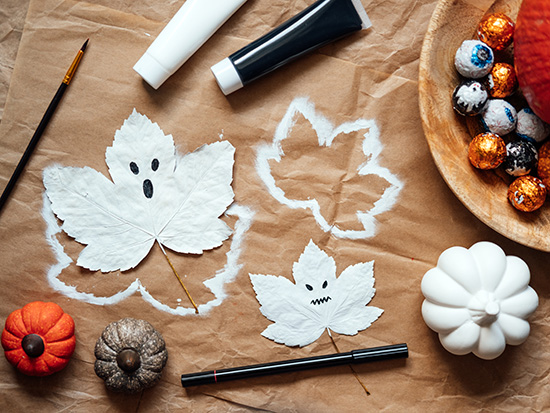Media Contact: Tehreem Khan
 Using pillowcases or tote bags for trick-or-treating, thrifting costumes, reusing decorations, and purchasing local fall produce are all sustainable ways to celebrate the spooky season.As Halloween nears, many seek sustainable ways to celebrate. From eco-friendly costumes and decorations to green trick-or-treating tips, there are plenty of ways to enjoy the spooky season while reducing carbon footprint.
Using pillowcases or tote bags for trick-or-treating, thrifting costumes, reusing decorations, and purchasing local fall produce are all sustainable ways to celebrate the spooky season.As Halloween nears, many seek sustainable ways to celebrate. From eco-friendly costumes and decorations to green trick-or-treating tips, there are plenty of ways to enjoy the spooky season while reducing carbon footprint.
Emily Colpack and Amelia Dobbs with the University of Alabama at Birmingham Green Labs say a few small changes can make a big difference in reducing waste and supporting sustainable practices.
Using pillowcases or tote bags for trick-or-treating, thrifting costumes, reusing decorations, and supporting local farmers by purchasing fall produce are all sustainable ways to celebrate the spooky season.
Costumes and decorations
Colpack suggests using eco-friendly materials such as cardboard boxes, fabric scraps, and natural dyes like beet juice or turmeric to make Halloween costumes.
“Thrifted clothes from a second-hand store can also create unique and sustainable costumes,” said Colpack, Sustainability Program coordinator for UAB Green Labs. “These materials help reduce waste and add a creative touch to Halloween attire.”
Repurposing old clothes or household items is another way to make eco-friendly costumes and decorations.
“Old clothes can be transformed with sewing or fabric pens to create new designs,” Colpack said. “This makes costumes both eco-friendly and original.”
For decorations, use real pumpkins, dried leaf garlands and yarn “spider webs” to avoid plastic waste. Painting cardboard boxes as tombstones or ghosts and using bowls of apples, nuts, and leaves are also sustainable options.
“Using eco-friendly outdoor decorations helps prevent animals and insects from getting caught in them or getting sick from eating them.” Colpack said. “These alternatives add a natural touch to Halloween celebrations.”
Trick-or-treating and party ideas
Colpack suggests distributing candy in paper wrapping or treats with edible wrapping to reduce waste.
“Offering items like notepads, pencils or other small toys can be eco-friendly alternatives that last longer than candy,” Colpack said.
To cut down on carbon emissions, she suggests carpooling for trick-or-treating. “Carpooling is eco-friendly and a lot more fun for children as they get to ride with friends and family,” she said.
Colpack encourages using reusable bags, like pillowcases or tote bags, instead of single-use plastic bags for collecting treats.
For hosting Halloween parties, she advises sending digital invitations to avoid paper waste and opting for reusable cups, plates and cutlery.
“Serve treats in biodegradable packaging, or bake your own,” Colpack said. “Baking your own treats using organic ingredients can be a fun activity.”
Set up a compost bin for organic waste, such as food scraps and pumpkin remains. Ensure that all recyclable materials, like paper and cardboard, are properly sorted and recycled.
Post-Halloween sustainability
To minimize waste after Halloween, Colpack encourages reusing decorations or donating them. Composting organic decorations like pumpkins, corn or leaves helps reduce waste, benefiting the environment.
“If you don’t have a way of storing or composting decorations for future years, donating decorations to local thrift stores or charities is another great option,” Colpack said.
Colpack says recycling candy wrappers after Halloween can be challenging, as they are often not accepted in curbside recycling programs or campus recycling bins.
“While some cities may accept clean aluminum foil, it is important to check with your local recycling program for specific guidelines,” Colpack said. “Exploring these options can help ensure that any recyclable materials are properly processed.”
UAB Sustainability has purchased a candy wrapper recycling bin; people can drop off their wrappers at the UAB Solar House after Halloween. Email solarhouse@uab.edu to schedule a dropoff.